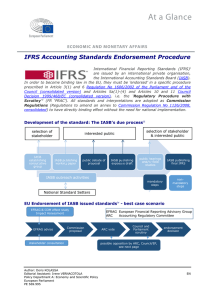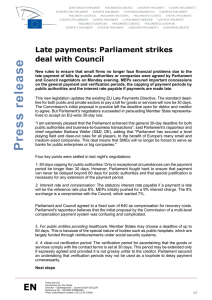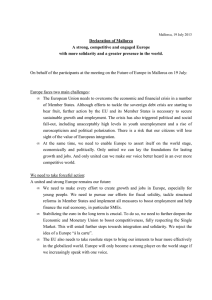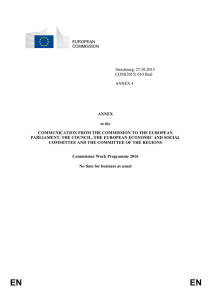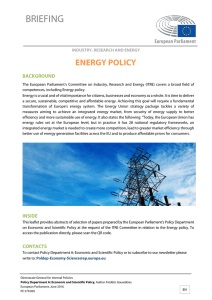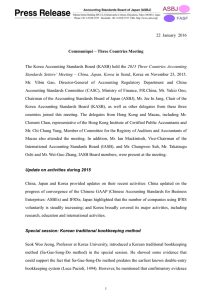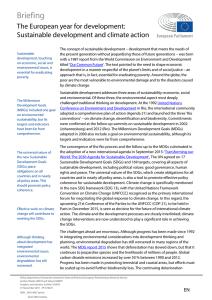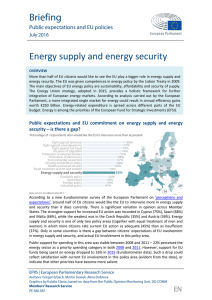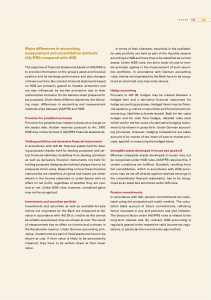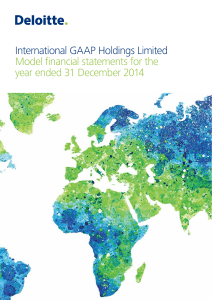Briefing: The Basis of the Endorsement Procedure for IFRS
Anuncio
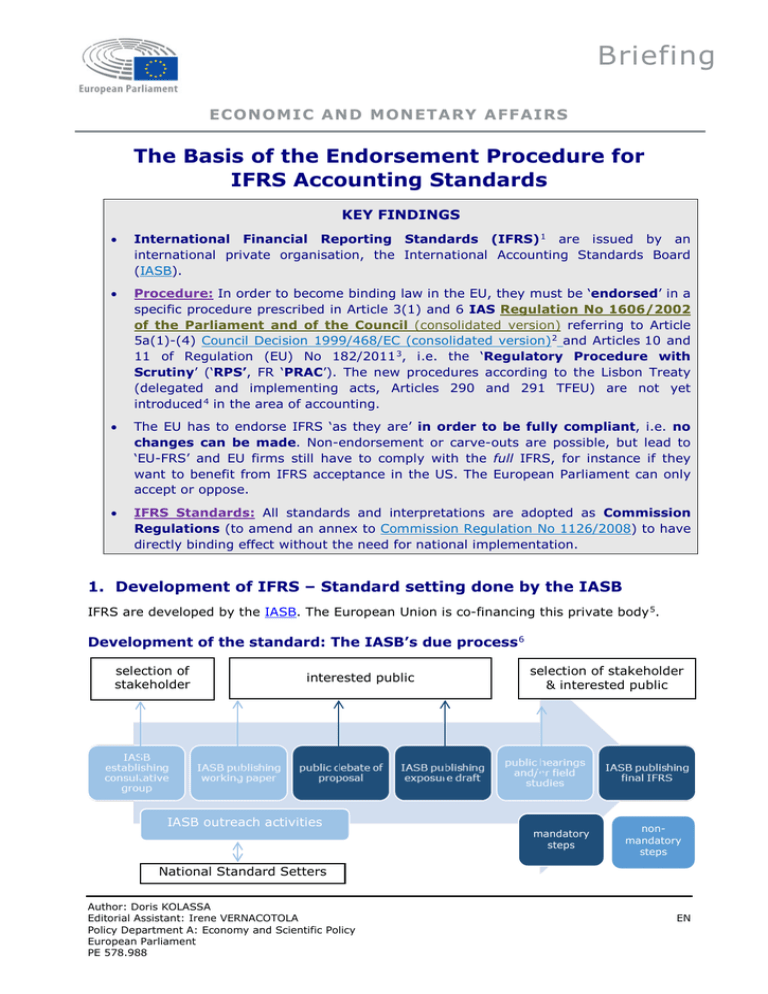
Briefing ECONOMIC AND MONETARY AFFAIRS The Basis of the Endorsement Procedure for IFRS Accounting Standards KEY FINDINGS • International Financial Reporting Standards (IFRS) 1 are issued by an international private organisation, the International Accounting Standards Board (IASB). • Procedure: In order to become binding law in the EU, they must be ‘endorsed’ in a specific procedure prescribed in Article 3(1) and 6 IAS Regulation No 1606/2002 of the Parliament and of the Council (consolidated version) referring to Article 5a(1)-(4) Council Decision 1999/468/EC (consolidated version) 2 and Articles 10 and 11 of Regulation (EU) No 182/2011 3, i.e. the ‘Regulatory Procedure with Scrutiny’ (‘RPS’, FR ‘PRAC’). The new procedures according to the Lisbon Treaty (delegated and implementing acts, Articles 290 and 291 TFEU) are not yet introduced 4 in the area of accounting. • The EU has to endorse IFRS ‘as they are’ in order to be fully compliant, i.e. no changes can be made. Non-endorsement or carve-outs are possible, but lead to ‘EU-FRS’ and EU firms still have to comply with the full IFRS, for instance if they want to benefit from IFRS acceptance in the US. The European Parliament can only accept or oppose. • IFRS Standards: All standards and interpretations are adopted as Commission Regulations (to amend an annex to Commission Regulation No 1126/2008) to have directly binding effect without the need for national implementation. 1. Development of IFRS – Standard setting done by the IASB IFRS are developed by the IASB. The European Union is co-financing this private body 5. Development of the standard: The IASB’s due process 6 selection of stakeholder interested public IASB outreach activities selection of stakeholder & interested public mandatory steps nonmandatory steps National Standard Setters Author: Doris KOLASSA Editorial Assistant: Irene VERNACOTOLA Policy Department A: Economy and Scientific Policy European Parliament PE 578.988 EN Policy Department A: Economic and Scientific Policy 2. Checking of of IFRS – Role of the EFRAG • • • • The European Financial Reporting Advisory Group (EFRAG) is a technical private law entity (with international non-profit organisation status under the Belgian law) created in 2001 by organisations representing European preparers, users and accounting professionals. EFRAG signed a Working Arrangement (WA) with the European Commission whereby the latter provides funding 7 (amounting to the level of the contributions of the other stakeholders) under yearly grant agreements in view of an extended EFRAG scope of tasks. The task of EFRAG is to ‘provide advice to the Commission on all issues relating to the application of IFRS in the EU. In this regard, EFRAG a) Provides its opinions in order for the Commission to take a view on endorsement of any IFRS [for application in the EU]’ (Point 1. WA). EFRAG has established a Technical Expert Group (TEG, max. 16 members) which provides opinions in support of the process for IFRS endorsement. ‘EFRAG-TEG’s opinions will assess whether the standard to be endorsed complies with Community law and in particular, the requirements of [IAS] Regulation 1606/2002 as regards understandability, relevance, reliability and comparability as well as the true and fair principle as set out in the 4th Directive 78/660 and the 7th Directive 83/349 [now integrated in Accounting Directive 2013/34/EU]. In supporting the process of endorsement of IFRS standards, EFRAG will issue, for each Standard […], an opinion within a maximum period of two months from notification of a request from the European Commission. Where EFRAG is unable to reach unanimous agreement on a given opinion it will transmit to the Commission the opinion which has the support of the majority as well as any written dissenting views provided in accordance with its governance rules. [… wide consultation prior to the issue of opinions, …] In expressing its opinions, EFRAG-TEG will justify how it reached those particular conclusions. Where EFRAG-TEG members do not concur with the endorsement advice, the dissenting opinions will be set out in writing.’ (Point 2.2 WA). • Voting: The EFRAG Board (having at least six Members) takes endorsement decisions by consensus (quorum required, Point 7.3.5 EFRAG Statue) after having considered the advice of the TEG and the results of EFRAG’s due process, and after having heard from the Accounting Regulatory Committee (ARC, see below) and made all assessments deemed relevant from a political perspective. • ‘For final endorsement advice to the European Commission: - If no consensus can be reached within the timeframe requested by the European Commission, the endorsement advice is submitted to the European Commission including the advice of the qualified majority (i.e. two-thirds (2/3)) of the Board members present or represented and dissenting opinions. - The Board members who disagree with the qualified majority view expressed in a final endorsement advice are obliged to have the reasons for their dissent recorded and explained in the advice letter or an addendum thereto. The name(s) of the dissenting Board member(s) are mentioned. - If in exceptional cases, no qualified majority can be found the President of the Board can present his conclusions based on an indicative vote whereby the majority view would be presented as the position with indication of the dissenting views held. - Dissenting views should relate to important elements of the final endorsement advice letter and not to secondary elements. Accordingly, only views that are so important that a dissenting member cannot accept the endorsement advice letter as a whole or a part of the consensus are included in the final endorsement advice. Dissenting views are to be justified by indicating concisely and clearly the specific matters with which a member disagrees.’; Point 7.3.5 b) iv) EFRAG Statute. requests EFRAG opinion on IFRS standard (notification of request) stakeholder consultation issues endorsement advice (within two months): positive if consensus, qualified majority, or simple majority; stating dissenting views European Commission 2 PE 578.988 IFRS Accounting Standards Endorsement Procedure 3. Parliament and Council scrutiny - Start of the PRAC procedure: Commission adopts proposal and submits it to ARC (= regulatory committee for IFRS) • • • • • • IFRS standards have to comply with the requirements of the IAS Regulation No 1606/2002 in order to be endorsed in the EU; according to Article 3(2) IAS Regulation the three cumulative endorsement criteria which need to be met are: - the standard is not contrary to the ‘true and fair view’ (TFV) principle as outlined in the EU Accounting Directives (now Directive 2013/34/EU), and - the standard is conducive to the European public good, and - the standard meets the criteria of understandability, relevance, reliability and comparability required of financial information which is needed for making economic decisions and assessing the stewardship of management. There is no unanimous interpretation of these criteria which are vague by nature and provide discretion in the endorsement process. This discretion provides the EU with ex ante power over the IASB’s standard-setting process 8. The objective of IFRS is to have one set of globally accepted accounting standards. Thus, in order to really be globally accepted, IFRS in the EU need to be fully compliant. Therefore, IFRS standards have to be endorsed in the wording as they have been issued by the IASB i.e. no changes can be made. Non-endorsement or carve-outs are possible, but then EU firms still have to comply with the full IFRS in their original wording if they want to benefit from IFRS acceptance, for instance in the US. According to Article 3(4) IAS Regulation, all standards and interpretations are proposed – and later adopted - as ‘Commission Regulations’ (i.e. regulations to amend an annex to Commission Regulation No 1126/2008, consolidated) to have directly binding effect without the need for national implementation. The Commission checks the three endorsement criteria, taking into account the view of EFRAG, previous public consultations and possibly discussions in the ARC. A proposal to amend (the annex of) Commission Regulation No 1126/2008 will be drafted in DG FISMA, go through interservice consultation, and has to be adopted by the College of Commissioners in order to become a proposal of the Commission to endorse an IFRS standard. The regulatory procedure with scrutiny starts with the adoption of a proposal and transmission to the Accounting Regulatory Committee (ARC, see Article 6 IAS Regulation) which is the regulatory committee in charge in the area of accounting standards. 4. EU Endorsement of IASB issued standards 9 - best case scenario EFRAG & COM effect study Impact Assessment stakeholder consultation PE 578.988 EFRAG European Financial Reporting Advisory Group ARC Accounting Regulatory Committee possible opposition by ARC, Council/EP, see next page 3 Policy Department A: Economic and Scientific Policy 5. Overview on legal provisions in the area of accounting Accounting Regulatory Committee (ARC) 1 - Contact Committee 2 Banks and Insurance specific [general provisions also apply] Accounting and IAS in general European Financial Reporting Advisory Group (EFRAG) 3 Accounting Directive 2013/34/EU 4;3 Amending Proposal (long-term shareholder engagement) 5 11th Cross-border Branches disclosure Directive 89/666/EC 6 IAS Regulation 1606/2002 International Accounting Standards Application Regulation 8 [=endorsement procedure + Council Decision 1999/468 9 on PRAC] Bank Branches Obligations Directive 7 IAS Adopting Regulation (EC) 1126/2008 10 [=EU IAS/IFRS] Annual Accounts and consolidated Accounts of Banks Directive 11 IAS Financing Regulation 12 [for co-financing EFRAG, IFRS Foundation and PIOB] Insurance Accounts Directive 13 Source: EP, based on EU Mapping: Systematic overview on economic and financial legislation, Brussels, 2014. 1 2 3 4 5 6 7 8 9 10 11 12 13 See http://ec.europa.eu/internal_market/accounting/governance/committees/arc/index_en.htm on this group. See http://ec.europa.eu/finance/accounting/governance/committees/contact-committee/index_en.htm; the Contact Committee meets together with ARC; COM states that it is an ‘advisory committee’, but according to Article 50 Accounting Directive 2013/24/EC which refers to Article 5 of Regulation 182/2011 on implementing powers, the ‘examination procedure’ applies (which is similar to the Regulatory Procedure with Scrutiny). See http://ec.europa.eu/internal_market/accounting/governance/committees/efrag/index_en.htm. Directive 2013/34/EU of the European Parliament and of the Council of 26 June 2013 on the annual financial statements, consolidated financial statements and related reports of certain types of undertakings, amending Directive 2006/43/EC of the European Parliament and of the Council and repealing Council Directives 78/660/EEC and 83/349/EEC, OJ L 182, 29.6.2013, p. 19; consolidated version; http://eur-lex.europa.eu/legalcontent/EN/TXT/PDF/?uri=CELEX:02013L0036-20150101&qid=1445004281879&from=EN. The Accounting Directive repeals the Fourth Council Directive 78/660/EEC of 25.7.1978 based on Article 54 (3) (g) of the Treaty on the annual accounts of certain types of companies; and Seventh Council Directive 83/349/EEC of 13.6. 1983 based on the Article 54 (3) (g) of the Treaty on consolidated accounts. Proposal for a Directive of the European Parliament and of the Council amending Directive 2007/36/EC as regards the encouragement of long-term shareholder engagement and Directive 2013/34/EU as regards certain elements of the corporate governance statement, COM(2014) 213 final; http://eurlex.europa.eu/LexUriServ/LexUriServ.do?uri=COM:2014:0213:FIN:EN:PDF. Eleventh Council Directive 89/666/EEC of 21 December 1989 concerning disclosure requirements in respect of branches opened in a Member State by certain types of company governed by the law of another State, OJ L 395, 30.12.1989, p. 36; consolidated version; http://eur-lex.europa.eu/legalcontent/EN/TXT/PDF/?uri=CELEX:01989L0666-20120706&from=EN. Council Directive 89/117/EEC of 13 February 1989 on the obligations of branches established in a Member State of credit institutions and financial institutions having their head offices outside that Member State regarding the publication of annual accounting documents, OJ L 44, 16.2.1989, p. 40; http://eurlex.europa.eu/legal-content/EN/TXT/PDF/?uri=CELEX:31989L0117&qid=1396284278324&from=EN. Regulation (EC) No 1606/2002 of the European Parliament and of the Council of 19 July 2002 on the application of international accounting standards, OJ L 243, 11.9.2002, p. 1; consolidated version; http://eur-lex.europa.eu/legal-content/EN/TXT/PDF/?uri=CELEX:02002R1606-20080410&qid=1396284041379&from=EN. Regulatory Procedure with Scrutiny (not yet adapted to Articles 290/291 TFEU): Council Decision 1999/468/EC, OJ L184 of 17.7.1999, p. 23; amended by Council Decision http://eur2006/512/EC, OJ L 200 of 22.7.2006, p. 11; consolidated version; lex.europa.eu/LexUriServ/LexUriServ.do?uri=CONSLEG:1999D0468:20060723:EN:PDF. Commission Regulation (EC) No 1126/2008 of 3 November 2008 adopting certain international accounting standards in accordance with Regulation (EC) No 1606/2002 of the European Parliament and of the Council, http://eur-lex.europa.eu/legalOJ L 320, 29.11.2008, p. 1; consolidated version; content/EN/TXT/PDF/?uri=CELEX:02008R1126-20130331&qid=1396284101551&from=EN. Council Directive 86/635/EEC of 8 December 1986 on the annual accounts and consolidated accounts of banks and other financial institutions, OJ L 372, 31.12.1986, p. 1; consolidated version; http://eurlex.europa.eu/legal-content/EN/TXT/PDF/?uri=CELEX:01986L0635-20060905&qid=1396283910993&from=EN. Regulation (EU) No 258/2014 of the European Parliament and of the Council of 3 April 2014 establishing a Union programme to support specific activities in the field of financial reporting and auditing [Financing Regulation] for the period of 2014-20 and repealing Decision No 716/2009/EC, OJ L 105 of 8.4.2014, p. 1; http://eur-lex.europa.eu/legal-content/EN/TXT/PDF/?uri=CELEX:32014R0258&qid=1444836499116&from=EN. Council Directive 91/674/EEC of 19 December 1991 on the annual accounts and consolidated accounts of insurance undertakings, OJ L 374, 31.12.1991, p. 7; as amended; consolidated version (2006); http://eurlex.europa.eu/legal-content/EN/TXT/PDF/?uri=CELEX:01991L0674-20060905&qid=1396283962386&from=EN. 4 PE 578.988 IFRS Accounting Standards Endorsement Procedure 6. Legal basis for the regulatory procedure with scrutiny (RPS/PRAC) • In order to become binding law in the EU, IFRS standards must be ‘endorsed’ in a specific procedure prescribed in Article 3(1) and 6 Regulation No 1606/2002 of the Parliament and of the Council (consolidated version) and Article 5a(1)-(4) and Article 8 Council Decision 1999/468/EC (consolidated version), i.e. the ‘Regulatory Procedure with Scrutiny’ 10 (‘RPS’; ‘PRAC’ is the abbreviation in French for ‘procédure de réglementation avec contrôle’). • The new (comitology) measures and procedures of the Lisbon Treaty (delegated and implementing acts, Articles 290 and 291 of the Treaty on the Functioning of the European Union, TFEU) are not yet introduced in the area of accountingsee 2. • The thresholds for opposing a proposed Commission measure are quite high: - qualified majority (QM) in the Council, - absolute majority (AM) of component members! for the European Parliament. • Any opposing decision must be justified by the European Parliament/Council and may only be based on three grounds indicating that the draft measures proposed by the Commission - exceed the implementing powers provided for in the basic instrument 11 or - that the draft is not compatible with the aim or the content of the basic instrument - or does not respect the principles of subsidiarity or proportionality. • Note: There is a specific possibility for the European Parliament foreseen in Article 8 Council Decision 1999/468/EC (see text on p. 6). But it requires immediate action as it takes place during the deliberation time of the ARC. If the European Parliament is of the opinion that a draft implementing measure submitted to the ARC exceeds the implementing powers contained in the IAS Regulation, it can indicate this by adopting a reasoned Resolution. In this case, the Commission has to re-examine the draft measure and may - within the timelimits of the procedure under way - submit a new draft measure to the ARC taking the Resolution into account. But the Commission can also continue with the procedure. The Commission has to inform the European Parliament and the ARC of the action which it intends to take on the Resolution and of its reasons for doing so. • The relevant articles in the IAS Regulation No 1606/2002 prescribe: PE 578.988 5 Policy Department A: Economic and Scientific Policy • The relevant articles in the Council Decision 1999/468/EC prescribe: Article 5a - Regulatory procedure with scrutiny 1. The Commission shall be assisted by a Regulatory Procedure with Scrutiny Committee composed of the representatives of the Member States and chaired by the representative of the Commission. 2. The representative of the Commission shall submit to the Committee a draft of the measures to be taken. The Committee shall deliver its opinion on the draft within a time-limit which the chairman may lay down according to the urgency of the matter. The opinion shall be delivered by the majority laid down in Article 205(2) and (4) of the Treaty [now Article 238 TFEU] in the case of decisions which the Council is required to adopt on a proposal from the Commission. The votes of the representatives of the Member States within the Committee shall be weighted in the manner set out in that Article. The chairman shall not vote. 3. If the measures envisaged by the Commission are in accordance with the opinion of the Committee, the following procedure shall apply: (a) the Commission shall without delay submit the draft measures for scrutiny by the European Parliament and the Council; (b) the European Parliament, acting by a majority of its component members, or the Council, acting by a qualified majority, may oppose the adoption of the said draft by the Commission, justifying their opposition by indicating that the draft measures proposed by the Commission - exceed the implementing powers provided for in the basic instrument or - that the draft is not compatible with the aim or the content of the basic instrument or - does not respect the principles of subsidiarity or proportionality; (c) if, within three months from the date of referral to them, the European Parliament or the Council opposes the draft measures, the latter shall not be adopted by the Commission. In that event, the Commission may submit to the Committee an amended draft of the measures or present a legislative proposal on the basis of the Treaty; (d) if, on expiry of that period, neither the European Parliament nor the Council has opposed the draft measures, the latter shall be adopted by the Commission. 4. If the measures envisaged by the Commission are not in accordance with the opinion of the Committee, or if no opinion is delivered, the following procedure shall apply: (a) the Commission shall without delay submit a proposal relating to the measures to be taken to the Council and shall forward it to the European Parliament at the same time; (b) the Council shall act on the proposal by a qualified majority within two months from the date of referral to it; (c) if, within that period, the Council opposes the proposed measures by a qualified majority, the measures shall not be adopted. In that event, the Commission may submit to the Council an amended proposal or present a legislative proposal on the basis of the Treaty; (d) if the Council envisages adopting the proposed measures, it shall without delay submit them to the European Parliament. If the Council does not act within the two-month period, the Commission shall without delay submit the measures for scrutiny by the European Parliament; (e) the European Parliament, acting by a majority of its component members within four months from the forwarding of the proposal in accordance with point (a), may oppose the adoption of the measures in question, justifying their opposition by indicating that the proposed measures exceed the implementing powers provided for in the basic instrument or are not compatible with the aim or the content of the basic instrument or do not respect the principles of subsidiarity or proportionality; (f) if, within that period, the European Parliament opposes the proposed measures, the latter shall not be adopted. In that event, the Commission may submit to the Committee an amended draft of the measures or present a legislative proposal on the basis of the Treaty; (g) if, on expiry of that period, the European Parliament has not opposed the proposed measures, the latter shall be adopted by the Council or by the Commission, as the case may be. [N.B. According to Article 6(2) IAS Regulation, paragraphs (5) and (6) on the prolongation or shortening of timelimits do not apply for the IFRS endorsement procedure.] Article 8 [repealed and replaced by Article 11 Regulation (EU) No 182/2011 – ‘right of scrutiny’] If the European Parliament indicates, in a Resolution setting out the grounds on which it is based, that draft implementing measures, the adoption of which is contemplated and which have been submitted to a committee pursuant to a basic instrument adopted under Article 251 of the Treaty, would exceed the implementing powers provided for in the basic instrument, the Commission shall re-examine the draft measures. Taking the Resolution into account and within the time-limits of the procedure under way, the Commission may submit new draft measures to the committee, continue with the procedure or submit a proposal to the European Parliament and the Council on the basis of the Treaty. The Commission shall inform the European Parliament and the committee of the action which it intends to take on the Resolution of the European Parliament and of its reasons for doing so. 6 PE 578.988 IFRS Accounting Standards Endorsement Procedure 7. Possibilities for EU Endorsement of IASB issued standards requests EFRAG opinion on IFRS standard Within 2 months: endorsement advice by consensus, QM, or simple majority; stating dissenting views European Commission Accounting Regulatory Committee (ARC)° transmission positive ARC opinion (QM) negative or no ARC opinion Commission submits proposal to Council and forwards it to EP simultaneously Commission submits proposal for scrutiny to Council and EP no Council/EP opposition within 3 months from referral date Regulation EFRAG Council (QM) opposes^ within 2 months [= no other EP role] Council (QM) or EP (AM) oppose^within 3 months Regulation cannot be adopted by COM i) Council envisages adoption and submits to EP ii) Council does not act within 2 months: COM submits to EP EP (AM) opposes within 4*/2 months EP does not oppose or react within 4* (resp. 2) months is adopted by COM but: Commission may submit ‘amended’ (e.g. carve-out) or ‘new’ (or old unchanged)# proposal to ARC Regulation is adopted by COM Legend: QM = qualified majority; AM = absolute majority (of component members) °ARC delivers its opinion within a time limit set by its chair, but can also refrain from formulating an opinion; ARC votes with qualified majority (QM) ^opposition must be justified and can only be based on the following three reasons: (i) exceed the implementing powers provided for in the basic instrument or (ii) that the draft is not compatible with the aim or the content of the basic instrument or (iii) does not respect the principles of subsidiarity or proportionality; *period calculated from the initial forwarding date (as the Council has two months); # IFRS must be endorsed unchanged in order to be fully compliant (see third bullet-point in Key Findings). PE 578.988 7 Policy Department A: Economic and Scientific Policy 1 2 3 4 5 6 7 8 9 10 11 IFRS are issued by the IASB; IFRIC are standards interpretations issued by the International Financial Reporting Interpretations Committee. While Decision 1999/468/EC is repealed, the effects of its Article 5a Regulatory Procedure with Scrutiny ‘shall be maintained for the purposes of existing basic acts making reference to them.’, see Article 12 Regulation (EU) No 182/2011 laying down the rules and general principles concerning mechanisms for control by Member States of the Commission’s exercise of implementing powers. The initial references to Articles 7 and 8 of Council Decision 1999/468/EC (consolidated version) must be read as references to Articles 10 and 11, respectively, of Regulation (EU) No 182/2005 laying down the rules and general principles concerning mechanisms for control by Member States of the Commission’s exercise of implementing powers (see Article 13(1)(e) thereof). The Commission has made a proposal to align the pre-Lisbon-Treaty RPS with the new delegated/implementing acts procedure according to Articles 290 and 291 TFEU in 2013 (see COM (2013) 451, no. 95 in the annex); however, this proposal was withdrawn in March 2015. For the European Parliament’s view see the procedural file A7-0010/2014. Legal basis for IASB funding: For 2014-2020, EU payments to the IASB of a total of EUR 31.6 million are allocated according to Article 6 Regulation (EU) No 258/2014 of the European Parliament and of the Council of 3 April 2014 establishing a Union programme to support specific activities in the field of financial reporting and auditing for the period of 2014-20 and repealing Decision No 716/2009/EC. By doing so, the EU has now become the largest single provider of financing to the IASB, contributing around 16 % of the organisation’s total donations. Source: Botzem, The EU’s Role in International Fora: Paper 7-The IASB, 2015, p. 24; based on IFRSF Due Process Handbook. Legal basis for EFRAG funding: For 2014-2020, EU payments to the EFRAG of a total of EUR 9.3 million are allocated according to Article 6 Regulation (EU) No 258/2014 of the European Parliament and of the Council of 3 April 2014 establishing a Union programme to support specific activities in the field of financial reporting and auditing for the period of 2014-20 and repealing Decision No 716/2009/EC. See the study of J. Bischof, H. Daske, IFRS Endorsement Criteria in Relation to IFRS 9, PE 563.460, European Parliament, Brussels, 2015, for a description and discussion of the IFRS endorsement criteria. Source: Botzem, p. 27, based on http://www.iasplus.com/en/resources/ifrs-topics/europe. The Commission has made a proposal to align the pre-Lisbon-Treaty PRAC to the new delegated/implementing acts procedure according to Articles 290 and 291 TFEU in 2013 (see COM (2013) 451, no. 95 in the annex); however, this proposal was withdrawn in March 2015. For the European Parliament’s view, see the procedural file A7-0010/2014. The ‘basic instrument’ is in this case IAS Regulation No 1606/2002 in conjunction with the legislative measures they refer to, namely ‘the 4th Directive 78/660 and the 7th Directive 83/349’ which are in the meantime repealed by (i.e. integrated into) the Accounting Directive 2013/34/EU. DISCLAIMER The content of this document is the sole responsibility of the author and any opinions expressed therein do not necessarily represent the official position of the European Parliament. It is addressed to Members and staff of the EP for their parliamentary work. Reproduction and translation for non-commercial purposes are authorised, provided the source is acknowledged and the European Parliament is given prior notice and sent a copy. This document is available at: www.europarl.europa.eu/studies Contact: Poldep-Economy-Science@ep.europa.eu Manuscript completed in April 2016 © European Union Internal Ref: ECON-2015-14 PE 578.988 CATALOGUE: QA-01-16-545-EN-C (paper) CATALOGUE: QA-01-16-545-EN-N (pdf) ISBN: 978-92-823-9275-1 (paper) ISBN: 978-92-823-9276-8 (pdf) doi: 10.2861/235902 (paper) doi: 10.2861/46774 (pdf)
